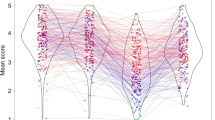Abstract
The Cognitive Response Test (CRT) was developed to assess clients' immediate thoughts that occur in conjunction with specific situations. The subject responds to 50 open-ended vignettes by writing his first thought. The CRT was administered to four groups of 15 subjects: (1) depressed psychiatric outpatients, (2) normal subjects, (3) nondepressed psychiatric outpatients, (4) nondepressed medical outpatients. Depressed patients obtained significantly higher Irrational-Depressed scores and significantly fewer Rational responses than subjects from the three control groups. These significant differences were maintained following item selection and analysis of the 25 most reliable items.
Similar content being viewed by others
Reference Notes
Lane, S. H., Bessai, J. L., & Bard, J. A.Irrational beliefs assessment: Perspectives. Paper presented at the First National Conference on Rational Psychotherapy, Chicago, June, 1975.
Weissman, A. N., & Beck, A. T.Development and validation of the Dysfunctional Attitude Scale. Paper presented at the 12th annual meeting of the Association for the Advancement of Behavior Therapy, Chicago, November 1978.
Rush, A. J., Giles, D. E., Dougherty, R., & Sullivan, D.Cognitive distortions, schemas, and depressive symptomatology. Paper presented at the First World Congress on Behavior Therapy, Jerusalem, Israel, July 1980.
References
Bandura, A.Aggression: A social learning analysis. Englewood Cliffs, New Jersey: Prentice-Hall, 1973.
Beck, A. T.Cognitive therapy and the emotional disorders. New York: International Universities Press, 1976.
Beck, A. T., Ward, C. H., Mendelson, J., Mock, J., & Erbaugh, J. An inventory for measuring depression.Archives of General Psychiatry 1961,4 561–571.
Ellis, A.Reason and emotion in psychotherapy. New York: Lyle Stuart, 1962.
Ellis, A., & Grieger, R. (Eds.).Handbook of rational-emotive therapy. New York: Springer, 1977.
Feighner, J. P., Robins, E., Guze, S. B., Woodruff, R. A., Winokur, G., & Munoz, R. Diagnostic criteria for use in psychiatric research.Archives of General Psychiatry 1972,26 57–63.
Goldfried, M. R. Anxiety reduction through cognitive-behavioral intervention. In P. C. Kendall & S. D. Gollon (Eds.),Cognitive-behavioral interventions: Theory, research, and procedures. New York: Academic Press, 1979. Pp. 117–152.
Goldfried, M. R., & Davison, G. C.Clinical behavior therapy. New York: Holt, Rinehart & Winston, 1976.
Hamilton, M. A rating scale for depression.Journal of Neurology, Neurosurgery and Psychiatry 1960,23 56.
Hamilton, M. Development of a rating scale for primary depressive illness.British Journal of Social and Clinical Psychology 1967,6 278.
Hollon, S. D., & Kendall, P. C. Cognitive self-statements in depression: Development of an automatic thoughts questionnaire.Cognitive Therapy and Research 1980,4 383–395.
Jones, R. G.A factor measure of Ellis' irrational belief system with personal and maladjustment correlates. Doctoral dissertation, Texas Technological College, 1968. (University Microfilms No. 69-6443).
Jung, C. G. The association method.American Journal of Psychology 1910,21 219–269.
Kendall, P. C., & Hollon, S. D. (Eds.).Cognitive-behavioral interventions: Theory, research, and procedures. New York: Academic Press, 1979.
Kendall, P. C., & Korgeski, G. P. Assessment and cognitive-behavioral interventions.Cognitive Therapy and Research 1979,3 1–21.
Krantz, S., & Hammen, C. L. Assessment of cognitive bias in depression.Journal of Abnormal Psychology 1979,88 611–619.
Mahoney, M.Cognition and behavior modification. Cambridge, Massachusetts: Ballinger, 1974.
Mahoney, M. Reflections on the cognitive-learning trend in psychotherapy.American Psychologist 1977,32 5–13.
Meichenbaum, D.Cognitive-behavior modification. New York: Plenum, 1977.
Seligman, M. E. P., Abramson, L. Y., Semmel, A., & von Bayer, C. Depressive attributional style.Journal of Abnormal Psychology 1979,88 242–247.
Simons, A. D.The process of change in cognitive therapy and pharmacotherapy of depression: Changes in mood and cognitions. Doctoral dissertation, Washington, University, St. Louis, 1982.
Watkins, J. T. The rational-emotive dynamics of impulsive disorders. In A. Ellis & R. Grieger (Eds.),Handbook of rational-emotive therapy. New York: Springer, 1977. Pp. 135–152.
Weissman, M. The assessment of social adjustment.Archives of General Psychiatry 1975,32 357–365.
Weissman, M. M., & Bothwell, S. Assessment of social-adjustment by patient self-report.Archives of General Psychiatry 1976,33 1111–1115.
Author information
Authors and Affiliations
Additional information
The CRT, Rules for Scoring, and the Training Program Manual are also available; however, printing and postage costs are $4. Make checks payable to Department of Psychiatry and Behavioral Sciences.
Rights and permissions
About this article
Cite this article
Watkins, J.T., Rush, A.J. Cognitive Response Test. Cogn Ther Res 7, 425–435 (1983). https://doi.org/10.1007/BF01187170
Issue Date:
DOI: https://doi.org/10.1007/BF01187170




